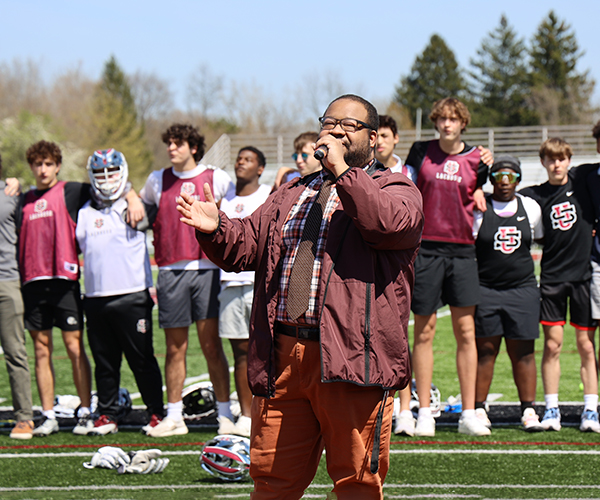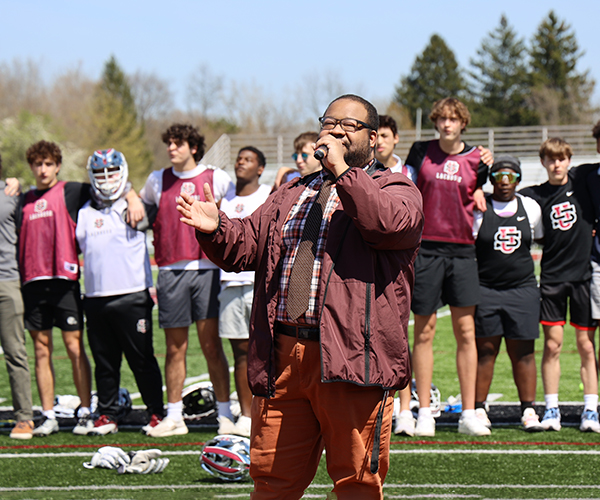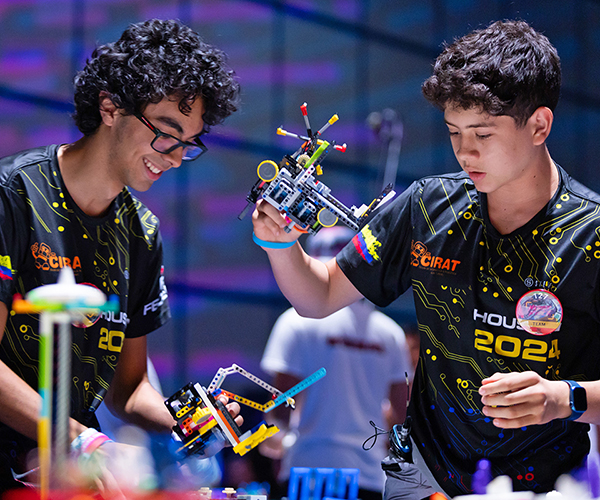It is one of the few rooms with furniture and plants, since their parents, Preston and Brenda, are having extensive work done on the home before the family completes the move from Minnesota to Shaker Heights.
The Hoopes trio look like ordinary American kids in the middle of summer. The girls wear denim capris and flip-flops. Chad has on a red and brown striped polo shirt and red Crocs. But then they pick up their violins and with a slight nod to each other, start playing Dvorak’s Terzetto in C Major — from memory.
| Alexandra Hoopes, 14, Anna Hoopes, 15, and Chad Hoopes, 12, and their parents Preston and Brenda, moved from Minnesota to Cleveland so the kids could attend the Cleveland Institute of Music to develop their musical talents. |
Their bows sail across the strings, flowing effortlessly between the smooth, eloquent parts to the brisk segments, requiring precise fingering and agile bow technique. They play their parts independently, yet they are seamlessly interwoven.
With your eyes closed, you might think you are listening to a professional trio from one of the world’s leading orchestras. But there’s no mistaking the vibrant youth and energy standing before you.
Anna, 15, Alexandra, 14, and Chad, 12, have extraordinary musical talents — enough to uproot the entire family to Cleveland so the kids can study with the master violinists at the Cleveland Institute of Music, David Cerone and Paul Kantor. They will also play in the Cleveland Orchestra Youth Orchestra.
Although they practice violin five hours every day, they also excel in school. Just take a look at their report cards — where a B is a rare occurrence (and in Chad’s case has never happened) — and you’ll see that their giftedness extends beyond the musical realm.
Anna can talk enthusiastically about advanced math. Alexandra and Chad mention their passion for history and science, respectively. All of them want to one day play in a top-five orchestra, preferably as concertmaster.
Besides violin and school, two of the three kids take a religious class from 6 to 7 a.m. every morning. (Chad won’t start them until he enters high school.) And Chad is a Boy Scout who plans to achieve Eagle Scout status by the time he’s 14.
Although that kind of schedule and discipline would make even an adult’s head spin, the three Hoopes siblings stand out because they are just such nice, happy, normal kids.
“Whenever we go and study with a master teacher and they say, ‘You’re actually normal.’ That’s a compliment for us,” says Chad. “It’s fun to have that said about you, because there’s some people who are … ”
“A little bit over the top,” his mom, Brenda, finishes his sentence and laughs. “Although people probably look at us and think we’re over the top. It’s all relative.”
Brenda admits it’s tough — especially for other adults — to understand why the family would move to another state, just for the children’s violin studies. The Hoopeses had planned to sell some belongings and load up a U-Haul to make the move, but when Preston told his employer, Nationwide Insurance, the company came through with a job in Cleveland and a complete relocation package.
The move should actually make their lives easier. In Minnesota, they spent hours in the car every day traveling to teachers and accompanists in different cities. Now, the drive will be a straight shot from Shaker Heights to the Cleveland Institute of Music in University Circle.
But, it’s no wonder many parents of gifted kids think others don’t understand. Fewer than 5 percent of children under 18 in the United States are cognitively gifted, according to the Davidson Institute for Talent Development in Reno, Nev.
In Ohio, of the 1,775,272 children enrolled in public school, grades K-12, only 285,246 have been identified as gifted and talented. That’s about 16 percent — three times the national average — but Ohio also has a broader definition of gifted than do some other states.
“There is no national mandate for gifted identification and service, so each state does something different,” explains Ann Sheldon, executive director of the Ohio Association for Gifted Children, located in a suburb of Columbus.
According to Sheldon, Ohio identifies children as gifted in four categories: superior cognitive (IQ usually above 130); specific academic (95 percent in math, social studies, science or reading/writing); creatively gifted; and in the visual and performing arts.
School districts vary widely in how they treat gifted children. Gifted children are the only population of special-needs students for which the state is not legally required to provide services.
Therefore, some districts do nothing at all, citing budgetary constraints. Others offer special pull-out programs. Some allow children to skip grades altogether or attend specific classes in a higher grade.
No specific program is the answer for all gifted kids. Parents need to know their kids and what works best for them, advises Felipe Amunategui, a child psychologist at University Hospitals of Cleveland.
“Being identified as gifted and being pulled out of a classroom for enrichment, marks you as the odd duck,” Amunategui says. “Depending on what grade you’re in, that increases your exposure to social ostracism.”
In some cases, parents should have the option to turn down programs, if it causes social or emotional difficulty for the child, Amunategui says.
Mike and Emma Jones — who asked that their real names and suburb not be used to protect their son — decided it was best to skip their profoundly gifted son, Paul, two grade levels. But other parents have criticized that decision.
“I know I’m not supposed to worry about what other people think,” Mike says. “They think it’s easy to have a bright child. But these kids think differently from the rest of us.”
It’s tough keeping up with Paul, who has far surpassed him in his mathematical ability, Mike says.
While he and Emma don’t want to quash his interests, it can also be draining for the parents who both work full time to find the right balance between school and supplementing that with challenging extracurricular activities.
“He didn’t want to be baby-sat for seven hours,” Emma says of the way Paul described school before they decided to jump him two grades.
The couple had tried other things as well, including both public and private schools. The support level at the schools varied widely, from negative teachers who seemed to be threatened by Paul’s advanced intellect to schools that tested, listened and worked with the family to get Paul to the right place. But both parents admit that it took a lot to find the right fit.
“If I have one piece of advice for parents of gifted kids,” Mike says, “it’s that you have to be an advocate for your child.”
Mike and Emma spend a lot of time searching for ways to keep Paul challenged.
One of the best resources, they say, has been the Davidson Institute, which was founded by Jan and Bob Davidson in 1999 to provide opportunities for profoundly intelligent young people.
The Davidsons wrote the book “Genius Denied,” about how schools are failing the brightest students, allowing them to become bored and frustrated — and in many cases, promoting underachievement and “dumbing down,” since it takes energy to cope with exceptional children.
The book and accompanying Web site (www.geniusdenied.com) have become like a bible to frustrated parents of gifted children.
Through the Davidson Institute, Mike and Emma linked Paul with a mentor. Although the mentor lives out of state, Paul works with him on math problems a couple hours each week over the phone, relieving Mike and Emma of trying to learn math that is beyond their own capabilities.
Getting a gifted child a mentor in the child’s area of interest is one of the best things parents can do, says Amunategui. But parents should stay involved, too, he advises.
“Allow the child to teach you,” says Amunategui. “So, while you may not be able to grasp the things the child is grasping, the fact that you show interest promotes the child’s continued engagement in the subject matter.”
Family dynamics also make an important difference in parenting a gifted child.
“Children who are gifted are still children,” says Sylvia Herd, a school psychologist with Cleveland Clinic. “They don’t have the ability to reason things through in a logical, objective way. It’s important to have an environment around them that helps stretch and support them. But they’re children first and the giftedness is a secondary attribute.”
Amunategui says his advice to parents of gifted children is simple: “Keep the rules. Keep the routines.”
For the Hoopes family, balance is key.
“To try to acquire as much natural balance as possible, I make the kids do chores,” Brenda Hoopes says. “Many hands make light work. If our family is going to be able to succeed and progress, everybody has to be on board. Sometimes parents don’t expect their kids to do some of the day-to-day grind that really builds character and sustains them in life when things don’t go just their way.”
The way a family views the child’s gift is also critical. Amunategui emphasizes that it’s important to not put the child on a pedestal.
In the Hoopes family, the philosophy is all for one, one for all. Instead of being competitive with each other, the kids cheer each other on at musical competitions. Preston and Brenda tell them to strive for their own personal best and celebrate each other’s successes.
And above all, they support the children, even if one would decide to leave the music world.
“I tell them every day, we’re giving you this gift right now and you can use it as a vehicle to go other directions,” Brenda says. “It’s not an end. It’s a means for accomplishing anything they might want to achieve.”



